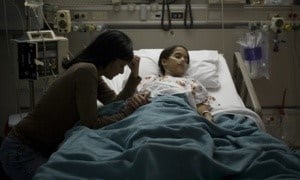Caregiver Traumatic Stress
- What is Caregiver Traumatic Stress?
- What causes it?
- What are the symptoms?
- Can I talk with my child about what happened?
- Here are some ways to help cope with a traumatic event involving a child.
- What should I do if I notice traumatic stress symptoms?
- Is this different than Post-Traumatic Stress Disorder (PTSD)?
What is Caregiver Traumatic Stress?
A caregiver is anyone who takes care of a child. It can be a parent, grandparent, aunt, uncle, or foster parent. Caregiver traumatic stress can happen when something very scary happens to their child. Caregivers react to stress in many ways. Traumatic stress symptoms may make it harder to care for a child. It may cause problems in daily life. Lots of stress can also make caregiver health problems worse.
What causes it?
Caregivers can have traumatic stress if they see their child go through a scary or life-threatening event, such as an accident, violence, or illness. Caregivers also can have stress if they hear that one of these events happened to their child. Traumatic stress is something that can happen to anyone.
What are the symptoms?
It is normal for caregivers to have lots of feelings after children have trauma. It can be very stressful to think about what their child is going through. Some fears and feelings of distress stay for a long time. They can include:
- Feeling sad or depressed, anxious or crabby.
- Always thinking about what happened, even if you do not want to.
- Crying for a long time when thinking or talking about what happened.
- Not wanting to talk to family members or friends.
- Having a hard time paying attention or “spacing out”.
- Having a hard time taking care of yourself.
- No longer wanting to do work or home activities.
- Having a hard time sleeping or sleeping more than usual.
- Getting stomachaches, headaches, or other body pain.
As the weeks pass, the feelings of sadness, anxiety, or crabbiness get worse.
Can I talk with my child about what happened?
Talking can help children cope. It helps children feel supported when they know someone is there to listen. When they begin to talk, let them know it is okay to have lots of thoughts and feelings about what happened. Stay positive with your child and focus on the support people in their lives who can help them get through this difficult time.
Here are some ways to help cope with a traumatic event involving a child.
Health
- Eat healthy meals at regular times in the day.
- Get at least 7 hours of sleep each night.
- Exercise each day.
- Avoid more alcohol use or smoking.
- Go to the doctor if you have a medical problem. Also, take medicines given to you by your doctor.
Lifestyle
- Follow a daily schedule as soon as possible.
- Relax. Try things such as art, music, reading, or meditation.
- Talk often with doctors or nurses to make sure your questions are answered.
- Keep a journal. Write your thoughts and feelings.
- Getting back to work can help. However, do not take on new projects at home or work.
Social
- Talk with trusted friends and family about your thoughts and feelings.
- Schedule time with others. Go out to lunch, for a walk, or just sit and talk.
- Talk with those in your faith group, or in other social groups to which you belong.
- Do fun things with friends.
- You do not have to talk with everyone, even if they send good wishes. Ask 1 or 2 people to send out information about your child to others who should have it.
What should I do if I notice traumatic stress symptoms?
It is important to get help if you have any of these symptoms. You may want to start by talking with your doctor. A mental health therapist can also be helpful if you have traumatic stress. An Employee Assistance Program (EAP) at work can help find a therapist for you. A social worker, clergy, or pastor can also be helpful. Getting help soon may stop long lasting problems with work, friends, or family life.
Is this different than Post-Traumatic Stress Disorder (PTSD)?
Some caregivers with traumatic stress may go on to develop PTSD. PTSD occurs when the symptoms last more than one month. The caregiver re-lives the event in their mind with intense fear. Caregivers may have problems with memory. Or, they may be very upset and anxious. A mental health therapist is needed to treat PTSD.



